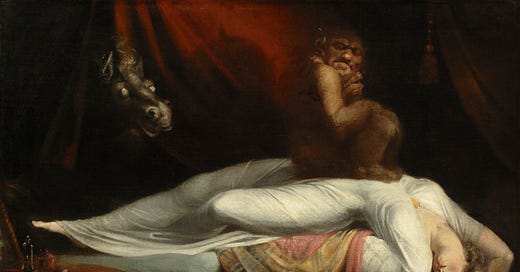I dreamt about my ex and then watched our sex tape. Is this bad?
With advice from Jane Eyre, Tess of the D'Urbervilles and The Science of Storytelling
Content warning: NSFW/ sexual themes. Continue at your own discretion!
Dear Emma,
I recently got into a new relationship with someone I really like. The last few days, however, I’ve thought and dreamt a lot about my ex. I woke up today feeling really horny for them so dug out an old sex tape of ours and masturbated over it. Is this bad?
Wow, so much to unpack here, and I’m excited for this more CosmoGirl-esque addition to the annals of Fictional Therapy - though as stated above, if this week feels a bit raunchy for you, then I won’t be offended if you skip it.
Firstly, no. Nothing you have told me is ‘bad’ or wrong or weird. Dreaming about your ex, feeling horny for your ex, masturbating about your ex - all these things are totally normal. (If you think I’m just being nice, a quick Google search will take you to half a dozen online surveys that corroborate this.) I can understand why you might feel as if you’ve somehow dishonoured your new relationship by dreaming about the past, but I really don’t think you have. The fact is, a long life filled with multiple meaningful partnerships means moments of nostalgia and reminiscence are inevitable. And no-one should be punished for the contents of their imagination or subconscious: for one thing, this would mean the end of literature (or at least the end of good literature). In the words of Claire Dederer, whose book I am currently reading: ‘Thoughts are not deeds. Stories are not crimes.’
But perhaps you didn’t mean ethically ‘bad’. Perhaps you were wondering whether this is a bad sign; whether dreaming about your ex at the dawn of a new relationship is your brain telling you that this new partner is not the one. In which case, I suppose the question is: how much - if any - significance should you ascribe to the workings of your unconscious mind?
Literature is full of significant dreams. In fact, based on a survey of classic books, you’d be forgiven for thinking that by paying close enough attention to your dreams you could understand the truest workings of your own psyche and literally predict your own future. In Charlotte Bronte’s gothic novel Jane Eyre, the titular Jane is also plagued by dreams at the start of a new relationship: two nights before marrying Rochester, she dreams his manor, Thornfield Hall, has been reduced to a ‘dreary ruin’; so eviscerated that 'nothing remained but a shell-like wall’. Given that Rochester’s secret first wife, Bertha Mason, will eventually burn down Thornfield Hall, this dream feels more like a premonition, and an accurate one at that. Then there’s the nocturnal sequence in Tess of the D'Urbervilles, which takes place just after Angel marries Tess and discovers, to his horror, that she is not a virgin (a dynamic I unpacked in a previous week if you need more context.) While Angel is asleep, he looks at Tess, cries out ‘Dead! Dead! Dead!’, and rolls his wife up in a bedsheet ‘as in a shroud’. He then sleepwalks out of the house with Tess in his arms and deposits her into an ‘empty stone coffin’. With Tess subjected to her living grave, Angel is finally satisfied: ‘having kissed her lips a second time he breathed deeply, as if a greatly desired end were attained’.
It’s a strange scene - partly because it feels so unrealistic, but also because it feels so on the nose. Angel’s somnambulist activity is the exact physical expression of his repressed desire to both possess and punish his wife. This sort of thing is why I almost never enjoy dream sequences in books: they are moments in which the hand of the author inevitably feels too visible. A dream in a book means we are being given a clue, whether abstracted or obvious, about the psychology of the character dreaming. Being guided in this way often reminds a reader that they are engaging in fiction.
Keep reading with a 7-day free trial
Subscribe to Fictional Therapy to keep reading this post and get 7 days of free access to the full post archives.




